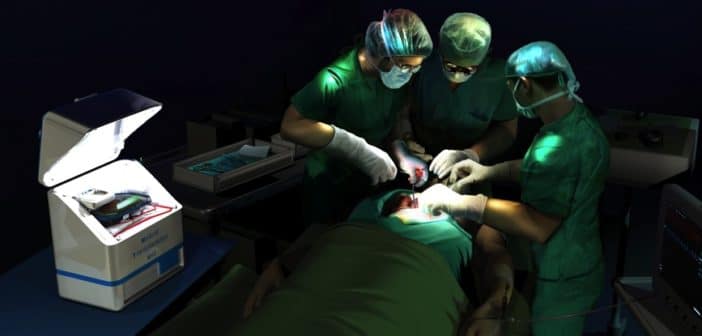 Old sci-fi movies used to paint pretty bleak visions of what 2016 would look like: devastated wastelands; lakes of oil; picked-over junkyards; snowdrifts of ash. Those visions of “2016” weren’t the ones that bothered me, though. No, the really unsettling ones were where the characters couldn’t get away from the news. That’s what made Blade Runner and Minority Report so terrifying: bad news blared from every corner, window and wristwatch. That’s how I feel about America’s drug epidemic. We’re living in that future where those headlines are inescapable, and the statistics are as grim as they are constant. From local police blotters to text alerts, news about the country’s opioid addiction is almost an assault on the senses. And when you stop to consider it, it’s way more frightening than any post-atomic landscape could ever be. The CDC reports that nearly 80 Americans die every day from an overdose so, if you’re skeptical about hope, you’d be forgiven. But you’d also be completely wrong. Amidst the nation’s overdose crisis, there’s a silver lining emerging in New England—one that’s all at once surprising, tragic and inspiring.
Old sci-fi movies used to paint pretty bleak visions of what 2016 would look like: devastated wastelands; lakes of oil; picked-over junkyards; snowdrifts of ash. Those visions of “2016” weren’t the ones that bothered me, though. No, the really unsettling ones were where the characters couldn’t get away from the news. That’s what made Blade Runner and Minority Report so terrifying: bad news blared from every corner, window and wristwatch. That’s how I feel about America’s drug epidemic. We’re living in that future where those headlines are inescapable, and the statistics are as grim as they are constant. From local police blotters to text alerts, news about the country’s opioid addiction is almost an assault on the senses. And when you stop to consider it, it’s way more frightening than any post-atomic landscape could ever be. The CDC reports that nearly 80 Americans die every day from an overdose so, if you’re skeptical about hope, you’d be forgiven. But you’d also be completely wrong. Amidst the nation’s overdose crisis, there’s a silver lining emerging in New England—one that’s all at once surprising, tragic and inspiring.
Does New England Know Something Everyone Else Doesn’t?
According to a recent NPR feature, organ donations from drug overdose victims have skyrocketed in recent months. And it’s not a national trend, either—it’s specific to New England. “It’s remarkable and it’s also tragic,” Alexandra Glazier, the president and CEO of the New England Organ Bank told NPR. “We see this tragedy of the opioid epidemic as having an unexpected life-saving legacy.” The spike in donations is much higher in New England than the rest of the US—a confounding trend that continues to puzzle medical experts. As it stands, only two New England states—New Hampshire and Rhode Island—rank among the country’s 10 worst when it comes to drug overdoses. (New Hampshire saw 26.2 overdose deaths per 100,000 people in 2014, while Rhode Island saw 23.4.)
A US News and World Report feature also observed that America’s drug overdose epidemic has “produced a dramatic rise in the number of desperately needed organs for people on transplant waiting lists.” In New England alone, the number of donors spiked by 575 percent over just the last five years. (That stat even reads like gloriously unbelievable sci-fi.) Glazier told NPR that part of the answer may lie in the transplant centers that “may be more aggressive about finding a match for patients with failing hearts, livers or kidneys.” New Englanders may also simply be better at living with addiction and planning for the inevitable.
Risky Business
Some people, however, remain leery of receiving organs from people who died from drug overdoses. And why not? Nothing about “drug-overdose victim” screams “perfect health.” That said, many transplant experts contend that the risk of contracting HIV, Hepatitis B or C, or other infectious diseases is startlingly low. In fact, organs from people who used drugs aren’t “necessarily risky and may even be healthier than other options,” the NPR story said.
“You have to remember that as awful as this outbreak is, these are younger people who are dying, often with needles in their arms, and many of them were first-time drug users. They weren’t all addicts,” one expert noted—a chilling reminder that Americans are dealing with an entirely different donor pool now than in the past. Furthermore, most hospitals are required to “test organs and warn patients [of potential risks].” And even if a patient somehow became infected, next-generation drugs and treatment can bring that risk back to zero.
Short-Listed
With more donor organs available than ever before, transplant patients shouldn’t have to wait as long, right? Not so fast. The transplant waiting list remains longer than ever. “Despite the increase in available organs, there’s no sign that the supply is keeping up with the demand from aging Americans and those with chronic diseases,” the NPR story said. Right now, almost 80,000 Americans are waiting for an organ, though 20 people on that list die daily before the right one is found.
Organ donation simply isn’t the first thing on people’s minds—let alone the 20-somethings who most often die from drug overdoses. Even worse is the idea that “there are likely many more organs available from the victims of drug overdoses than those collected,” one expert suggested. “Some patients addicted to heroin or other opioids don’t carry a driver’s license, haven’t spoken to a family member about their end-of-life wishes, or aren’t in touch with family members who could give consent to donate an organ.” Put another way, when it comes to America’s youth and the idea of donating a kidney: “I’m not sure it’s on their radar screen,” one Boston medical official said. Whatever the case, New England is a case study for how to turn weaknesses into strengths, and how to give hope a new place to live and grow.
Sponsored DISCLAIMER: This is a paid advertisement for California Behavioral Health, LLC, a CA licensed substance abuse treatment provider and not a service provided by The Fix. Calls to this number are answered by CBH, free and without obligation to the consumer. No one who answers the call receives a fee based upon the consumer’s choice to enter treatment. For additional info on other treatment providers and options visit www.samhsa.gov.




